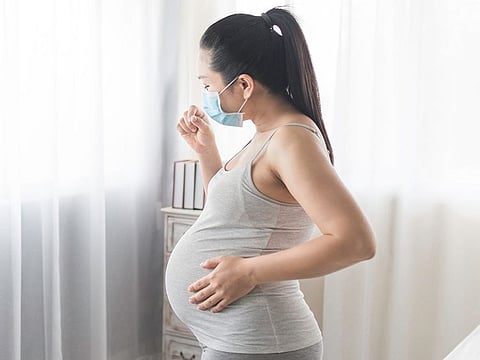COVID-19 and Pregnancy: Advice for expectant and breastfeeding mums in the UAE
We spoke to a UAE-based doctor to bring you the latest guidance for expectant UAE mothers

Pregnancy can be an anxious time in the best of circumstances, but the spectre of novel coronavirus and the increasing restrictions imposed on our lives as the world grapples with this pandemic are enough to make anyone feel on edge.
While the data on pregnancy and Covid-19 is still very limited, we've gathered together some guidance from UAE doctors and international guidelines to help make you as informed as possible.
Are pregnant women likely to be more susceptible to Covid-19 compared with the general public?
Dr Amit Majumdar, Deputy Chief Medical Officer at King’s College Hospital London, UAE says: "The number of cases with confirmed COVID-19 in pregnancy is not very high, although the evidence is still emerging. However, pregnant women do not appear to be more susceptible to COVID-19 than the general population."
While the US-based Center for Disease Control and Prevention (CDC) warns that pregnant women experience changes in their body that can increase the risk for certain infections, and recent evidence shows that pregnant women are at greater risk of being hospitalised for more severe forms of COVID-19, Dr Amit Majumdar emphasises that, "The majority of women will experience only mild or moderate cold/flu like symptoms."
Do pregnant women with Covid-19 have an increased risk of adverse pregnancy outcomes?
"There are currently no data suggesting an increased risk of miscarriage or early pregnancy loss in relation to COVID-19," says Dr Amit. "There is also no solid evidence that the virus can pass to your developing baby while you are pregnant (this is called vertical transmission). It is therefore considered unlikely that if you have the virus it will cause abnormalities in your baby.
"Some babies born to women with symptoms of coronavirus in China have been born prematurely. It is unclear whether coronavirus caused this, or the doctors made the decision for the baby to be born early because the woman was unwell."
Is it likely that pregnant women with Covid-19 would spread it to their baby?
"There is no evidence to suggest there is increased risk of spreading the virus to the baby either through the placenta during pregnancy or during delivery."
What precautions should pregnant women take against catching Covid-19?
Dr Amit explains: "Travel safety is very important. You need to be assessed if:
What should a pregnant woman who is experiencing respiratory symptoms in the UAE do?
"Phone your hospital maternity or ED department. They will direct you where and how to report. You will be assessed by the doctor and diagnostic swabs will be taken if you are considered at high risk of infection. In addition, you will need to be isolated till its confirmed whether you have the infection or not."
Are there any treatments recommended for respiratory symptoms that pregnant women should avoid?
"There is currently no specific medicine to prevent or treat COVID-19, but there are treatments to relieve the symptoms while your body fights the illness.
In addition, you and your baby will be monitored closely."
What will happen during my birth if I get coronavirus?
"Pregnant women with suspected or confirmed coronavirus when go into labour, continuous electronic fetal monitoring is advised as a precautionary approach to check how baby is coping with labour
In addition, women require close monitoring, specifically for oxygen levels.
There is currently no evidence to suggest you cannot give birth vaginally However, if your respiratory condition (breathing) suggested that urgent delivery would be needed, a caesarean birth may be recommended.
There is no evidence that women with suspected or confirmed coronavirus cannot have an epidural or a spinal block.
You can stay with baby/give skin-to-skin if you wish to Provided your baby is well and doesn’t require care in the neonatal unit.
At the moment there is no evidence that the virus can be carried in breastmilk, so it’s felt that the well-recognised benefits of breastfeeding outweigh any potential risks of transmission of coronavirus through breastmilk.
The main risk of breastfeeding is close contact between you and your baby, as you may share infective airborne droplets, leading to infection of the baby after birth.
If you choose to breastfeed your baby, the following precautions are recommended:
How can a pregnant women avoid catching coronavirus?
Pregnant women are in the bulnerable category when it comes to COVID-19 and as such should have priority for home working if they are employed. "The best way to slow the spread of virus is to follow general hygiene measures like hand washing and avoiding coming in contact with people who are unwell.
Wash your hands more often than usual, for 20 seconds and whenever you:
It's important to use soap and water or a hand sanitiser."
Read more:
Sign up for the Daily Briefing
Get the latest news and updates straight to your inbox



